Today is International Women’s Day. Being a woman is a social determinant of health (for the worse).
To mark the occasion of the Day, The International Labour Organization (ILO) published a report on women and work yesterday, finding that in the 178 countries studied, inequality between women and men persists across labor markets. And while there’s been progress in women’s education over the past twenty years, this hasn’t resulted in women advancing career paths and wage equality.
It struck me this morning, reading both (paper versions of) the Wall Street Journal and the Financial Times that the latter had two FT-sponsored ads marking International Women’s Day (one full-page, and one featured here, on “Happyish International Women’s Day — ‘ish’ because only 26% of FTSE 100 board members are now female, according to the ad) along with an 8-page section titled “Women in Business” with stories titled “Diversity at the top pays dividends,” “Male founders win decisively in fierce battle for start-up funding,” and, “Housework stymies wives worldwide,” along with stories on the need for childcare policies at the workplace, campus sexual as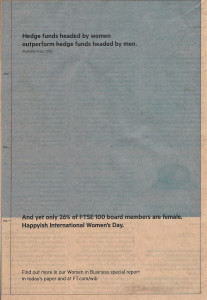 saults, and STEM programs, among others. The section boasts ads from Deloitte, PwC, the European Investment Bank, non-governmental organizations, and several business schools. By the way, the FT is published out of London, UK.
saults, and STEM programs, among others. The section boasts ads from Deloitte, PwC, the European Investment Bank, non-governmental organizations, and several business schools. By the way, the FT is published out of London, UK.
In contrast, there was no mention of International Women’s Day in the Wall Street Journal today in either an ad or an article. Zero. (The WSJ is published in New York City, USA).
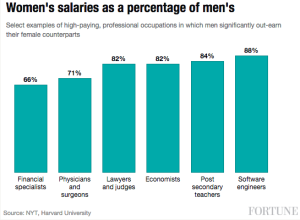 I’m gratified to see good coverage in Fortune magazine today, featuring the bar chart on unequal pay for equal work in the U.S.
I’m gratified to see good coverage in Fortune magazine today, featuring the bar chart on unequal pay for equal work in the U.S.
The UN says it’s a time to reflect on progress made, in the context of this year’s theme, “Planet 50-50 by 2030.” The goal: to achieve global equality in education and end all forms of discrimination.
TIME magazine published this gender-based pay calculator on their website; check to see how you’re doing wage-wise.
Health Populi’s Hot Points: Being a woman is indeed a social determinant of health: women pay more for health care services, have less access to evidence-based care for heart disease (for example), put their families’ and pets’ healthcare before their own. But women are also the Chief Health Officers of their families and households.
During this weekend’s South-by-Southwest Interactive festival, my tribe of women health-tech leaders will be featured on a panel on women’s voices in health technology called Chicks in Charge. The great session features Lisa Suennen (that intrepid Venture Valkyrie) at the helm, plus Alexandra Drane (founder of the Eliza Corporation and standard bearer for end-of-life care and The Unmentionables, those real-life stressors that diminish or bolster health), and Amy Cueva, design guress who leads Mad*Pow. I was an original member of this crew, but the SXSW powers-that-be asked our panel of four women to “exchange” one of us for a male for the cause of diversity.
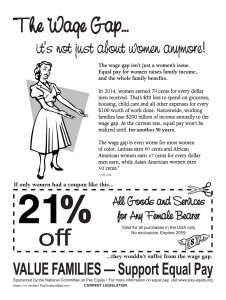 I gave up my seat. I’ve participated on SXSW panels for each of the past five years, so no worries there. Marcus Osborne of Walmart will be seated in my place. Don’t get me wrong: I’m a long-time supporter of what Marcus has been doing at Walmart to benefit health consumers through the retailer’s many health touchpoints, and he’ll do even more in his newly-announced role as VP of healthcare transformation. For more on my observations of Walmart-as-health-provider and the growth of retail health, see my latest post on the topic about the new-new health fair among many other posts here on Health Populi (use the Library search tool to find more).
I gave up my seat. I’ve participated on SXSW panels for each of the past five years, so no worries there. Marcus Osborne of Walmart will be seated in my place. Don’t get me wrong: I’m a long-time supporter of what Marcus has been doing at Walmart to benefit health consumers through the retailer’s many health touchpoints, and he’ll do even more in his newly-announced role as VP of healthcare transformation. For more on my observations of Walmart-as-health-provider and the growth of retail health, see my latest post on the topic about the new-new health fair among many other posts here on Health Populi (use the Library search tool to find more).
But irony of ironies, right?
In this era of consumer-directed health, remember that most women are the Chief Health Officers of their families. And the woman’s voice continues to be lost in all-too-many health and health-tech endeavors. If you’re attending SXSW this weekend, listen to Lisa, Alex, Amy and Marcus: you’ll surely hear those strong, important voices.
Postscript from #SXSW16 on 3-14-16: The “Chicks in Charge” panel with Lisa, Alex, Amy and Marcus went wonderfully well, based on the many tweets emanating from the session at SXSW. I learned, however, that many panels at SXSW were populated with 100% women and others with 100% men, so it is a conundrum that ours was identified as one that was compelled to “diversify.” We’re going to sort out why that was and I look forward to reporting back to Health Populi readers the “why?”


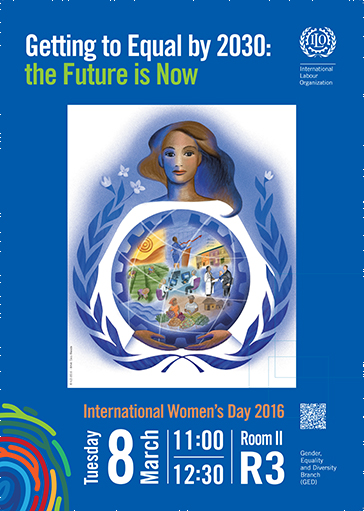
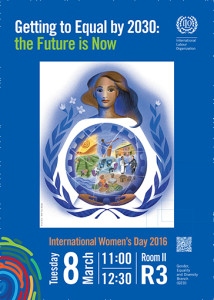


 Interviewed live on BNN Bloomberg (Canada) on the market for GLP-1 drugs for weight loss and their impact on both the health care system and consumer goods and services -- notably, food, nutrition, retail health, gyms, and other sectors.
Interviewed live on BNN Bloomberg (Canada) on the market for GLP-1 drugs for weight loss and their impact on both the health care system and consumer goods and services -- notably, food, nutrition, retail health, gyms, and other sectors. Thank you, Feedspot, for
Thank you, Feedspot, for  As you may know, I have been splitting work- and living-time between the U.S. and the E.U., most recently living in and working from Brussels. In the month of September 2024, I'll be splitting time between London and other parts of the U.K., and Italy where I'll be working with clients on consumer health, self-care and home care focused on food-as-medicine, digital health, business and scenario planning for the future...
As you may know, I have been splitting work- and living-time between the U.S. and the E.U., most recently living in and working from Brussels. In the month of September 2024, I'll be splitting time between London and other parts of the U.K., and Italy where I'll be working with clients on consumer health, self-care and home care focused on food-as-medicine, digital health, business and scenario planning for the future...